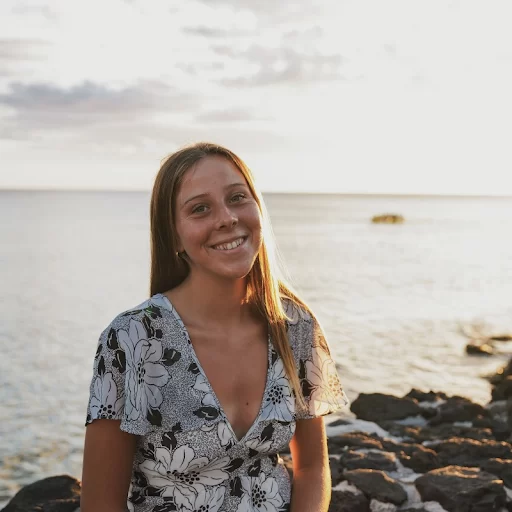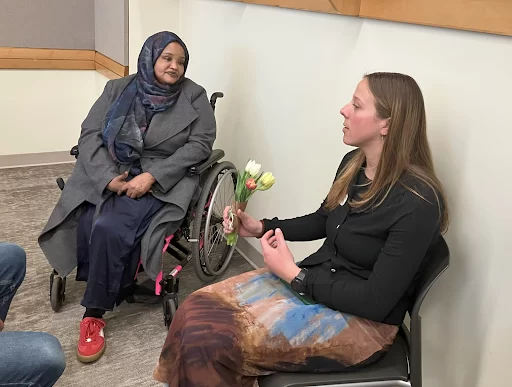Trust and Reciprocity in Research on Somali Daughterhood: A Conversation with Maggie Kornfeind ’25
Maggie Kornfeind ’25 of Ringoes, New Jersey was one of two Bates seniors recognized recently for outstanding community-engaged academic work. Below, Maggie discusses her research into experiences of daughterhood among Somali women – research she completed in collaboration with a local community organization, Maine Community Integration.
You’ve been collaborating with a Maine-based community partner for several semesters. Who have you been working with, and what approach have you taken in that work?
I’ve had the pleasure of working with Maine Community Integration (MCI) over the past year and a half as a student within Bates’ Psychology Department, working under the guidance of Professor Yun Garrison. MCI aims to empower New Mainers through a culturally sensitive and trauma-informed approach that supports the growth and aspirations of immigrant youth and adults.
I’ve been grateful to work alongside MCI’s leaders on a few different projects, all of which seek to incorporate Somali youth in community-engaged research that centers the voices of Somali daughters and promotes both collective and individual healing. My research sought to establish relationships built on trust and reciprocity while also helping others define their sense of self. As a student researcher, I aimed to create spaces that promote storytelling, create dialogue around mental health and aspects of identity, and ultimately provide future students at Bates with an understanding of how to conduct ethical and meaningful community-engaged research, particularly research related to the Somali refugee community in Lewiston.
What, specifically, have you been exploring in your research? What methods have you employed, and what are some outcomes of your work?
My research was inspired by and organized around various frameworks that promoted holistic approaches to working with individuals of the Global majority, which examines how people from the Global Majority (GM) cope with and heal from experiences of oppression and racial discrimination (Lee et al., 2023). The GM includes individuals who identify as Black, Indigenous, and People of Color, or those who are not white, making up a majority of the world’s population.
This framework led to a very deliberate balance I used as a researcher to occupy an even amount of activity and productivity in the process of working with MCI, acknowledging my areas of bias and privilege as someone who is not a part of the GM. I worked with all sorts of incredibly strong and kind Somali individuals affiliated with MCI’s programming. In particular, I spent a lot of time creating ways for Somali daughters to explore their sense of self, which led to the identification of various expressions of Somali daughterhood, as experienced and voiced by Somali daughters themselves.
Using structured interviews, informal conversations, arts-based workshops, thematic analysis, reflexivity, case studies, and feedback surveys, I analyzed many forms of qualitative data to generate definitions of daughterhood. I also worked to apply this research to future considerations within this community. As of now, other Bates students conducting community-engaged research will have the opportunity to continue to develop further explorations of Somali daughterhood.
Why did you opt for community-engaged research instead of other approaches to pursuing new knowledge?
I was drawn to this work because of the kindness and openness of the Somali community, and how much human connection I felt and continue to feel. I immediately felt seen and heard by everyone at MCI, and I wanted to contribute to the selfless and accessible work they do and promote. I also felt passionate about doing work that addressed the intersectional experiences of young women in Lewiston, centering cultural values, gender identity, and other salient aspects of our lived experiences.
Much of the value of working with MCI to conduct community-engaged research derives from the process of humanizing participants and establishing trust to foster collaboration. It was often the “little” moments or “behind the scenes” moments that generated these experiences of shared connection: meals, community events, one-on-one conversations at MCI. These were small but important departures from traditional forms of research that isolate the researcher from the “objects” of study and often involve patronizing or dehumanizing relationships with those involved in the research study. Doing research that is rooted in relationships of trust and mutual compassion is humanizing for both the researcher and the community collaborators, and it can yield results that elude more traditional approaches.
What have you learned about yourself as a result of your community-engaged research?
This experience has truly changed the ways I understand myself as I strive to continue my education and clinical explorations of psychology, providing me with skills to act as both an ethical and compassionate support person. I have practiced asking questions that push me to go further into exploring how my identity as a researcher who holds significant academic privilege impacts the individuals involved in the research experience. As I prepare to head into another community where I will continue to occupy a similar role of working alongside others, I will hold with me the value of vulnerability and kindness shown to me by the Somali community in Lewiston.

